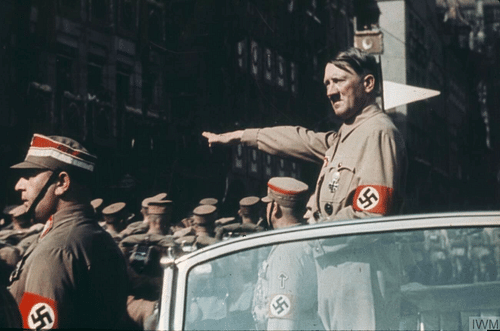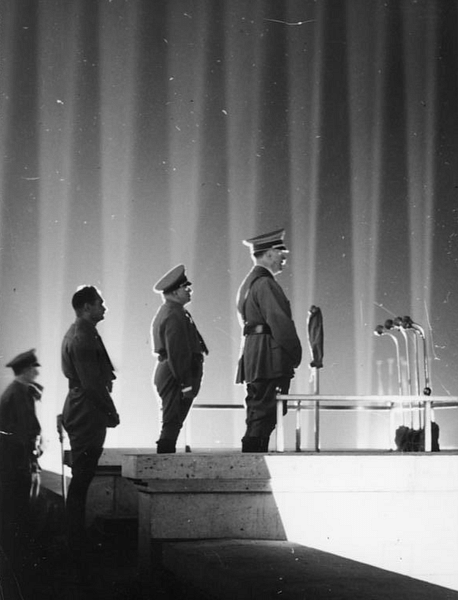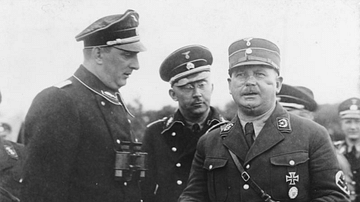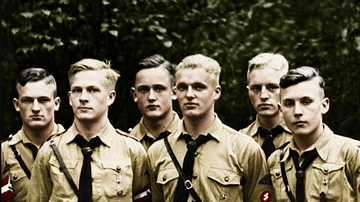The rise of Adolf Hitler (1889-1945), the Nazi dictator of Germany from 1933, was enabled by those already in power eager to take advantage of his popularity. Hitler promised to make Germany great again after the humiliation of WWI by restoring Germany's lost territories, returning to traditional German values, achieving full employment, and destroying 'enemies' like Communists and Jewish people.
Hitler's rise to power was a surprisingly long process, involving many steps and several significant setbacks such as his imprisonment following the failed coup known as the Beer Hall Putsch in November 1923. Hitler's rise to power effectively took a decade, with the Nazi Party gaining just 12 seats in elections for the German Reichstag (Parliament) in 1928 (from a total of 491 in that election), 107 in 1930, 230 in July 1932, 196 in November 1932, and 288 seats in 1933. Once securely in power as chancellor, in 1933, Hitler quickly eliminated all opposition and established a totalitarian regime with himself as undisputed dictator, Germany's Führer.
Adolf Hitler and the Nazi Party rose to power for the following reasons:
- The harsh terms of the Treaty of Versailles riled many Germans, especially the guilt clause for starting WWI, and traditional political parties were tarnished by association with the signing of the treaty. Hitler promised to overturn the treaty and restore German pride.
- The fallout of the Great Depression led to mass unemployment and hyperinflation leading voters to turn to more extreme political parties.
- The weakness and ineptitude of successive Weimar Republic coalition governments.
- Hitler promised full employment through such programmes as road building and rearmament.
- In return for their support, Hitler promised business leaders lucrative state contracts such as arms manufacturing. This idea was also popular with the German Army.
- Hitler appealed to traditional German beliefs like the greatness of the nation, strong family values, and a classless society.
- Hitler promised an expansion of Germany to find new lands and Lebensraum ('living space') where the German people could prosper.
- Hitler used propaganda to identify what the Nazis described as common enemies of the state, such as outsiders and Jewish people who, he claimed, were holding Germany back.
- A cult of Hitler was created, which promoted the idea that he was the saviour of Germany.
- The establishment thought that by inviting Hitler to power, they could better control the Nazi phenomenon and benefit from its popularity themselves.
- Once made chancellor, Hitler used his power to eliminate rivals. He ensured the German parliament had little power and began to establish a dictatorship with himself as the undisputed head of a one-party police state.
Historians continue to debate the weight of each of the above points in accounting for Hitler's rise to power.
The Treaty of Versailles
The First World War (1914-18) was formally terminated by the Treaty of Versailles, which dictated the terms of the German surrender. Germany lost a significant part of its territory, was obliged to pay reparations, and had to accept full responsibility for starting the conflict. The German people protested at these terms in 1919, and those German politicians who had agreed to it were widely referred to as 'the criminals of 1919'. This resentment was fuelled by the myth that the German people had been let down in WWI by the high command of their army, which had 'stabbed them in the back', otherwise, they might have won the war, many thought. Consequently, there was a feeling that the political and military establishment of the new Germany, the Weimar Republic (1918-33), could not be fully trusted.

The fascist National Socialist German Workers' Party (NSDAP or Nazi Party for short) was founded in 1920. The party was neither socialist nor at all interested in workers, but Adolf Hitler had chosen the name to give his ultra-nationalist party as wide an appeal as possible. Hitler was able to exploit the anti-establishment feeling as the Nazis were complete outsiders. As early as 1925, in his book Mein Kampf, Hitler promised to abolish the terms of Versailles and create a new 'Greater Germany'.
The Great Depression
In Germany in 1923, there was hyperinflation, which made savings worthless, a blow many of the German middle class never forgot; nor did they forgive the Weimar politicians for it. Worse was to come. The Great Depression, sparked off by the Wall Street stock-market crash of 1929, resulted in a crisis in many economies through the 1930s. There was a collapse in world trade, industrial production plummeted by 42%, prices fell, which badly affected industry and farmers, and many workers had their salaries cut. There was mass unemployment – as much as one-third of German workers lost their jobs. Unemployment in 1928 was 1.4 million; in 1932, it was 6 million. Crime, particularly juvenile crime, rocketed. A succession of weak coalition governments in the Weimar Republic (a situation not helped by the system of proportional representation) were blamed for their incapacity to deal with these severe economic problems.
Hitler, meanwhile, promised the German people he would give them work and bread, achieving full employment through such massive state-sponsored projects as building motorways and rearming Germany (something that had been severely limited by the Treaty of Versailles). Rearmament obviously appealed to the German generals, whose importance would correspondingly increase the larger the army was made. Hitler was likewise able to gain the support of business leaders since he promised not to interfere in their affairs, to limit the powers of trade unions, and to offer them huge state contracts such as construction and armaments manufacturing.
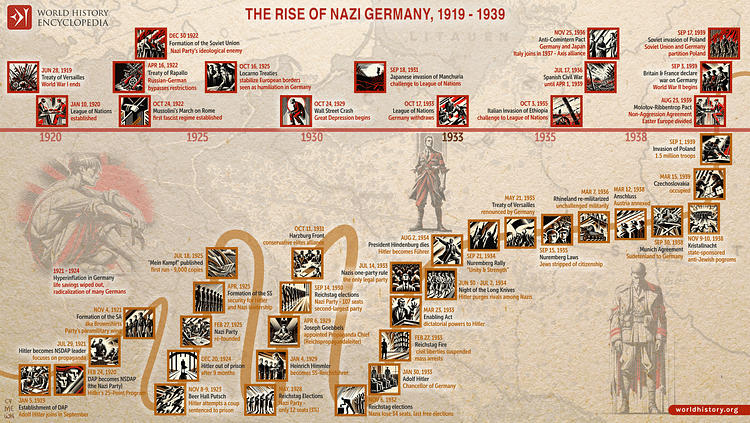
Traditional German Values
Hitler was keen to present the Nazi Party as an upholder of German traditions. The Nazis talked of the Volksgemeinschaft or people's traditional folk community, a self-sufficient society, which has no class distinctions. The Nazis cleverly attempted to appeal to as many sections of German society as possible, such as Protestants, farmers, workers, the middle class, young people, and women, targeting each with specific propaganda campaigns. This often meant their messages were actually contradictory, but this did not stop the Nazi propaganda machine. From an emphasis on the family to the virtues of growing a nation's own food, above all, these messages of mass appeal tapped into long-held views in Germany. As the historian F. McDonough states, "Hitler was the drummer of an old tune accompanied by modern instruments" (93). The strategy worked: “Electoral statistics show the Nazi Party was not a 'middle-class party', but gained votes from all social groupings, age groups and regions” (ibid, 88).
The search for popularity was not only aimed at adults but also future voters, and so the Hitler Youth was founded as early as 1922. The organisation was itself a nod to traditional German youth groups. Young boys (and later girls) were indoctrinated with Nazi ideology such as racial theory with a strong emphasis, too, on the advantages of physical exercise, wearing a smart uniform, obedience to authority, nationalism, militarism, and adoration of Hitler himself. As these teens became voters in the 1930s, so Hitler cultivated his own grassroots support, which was very often fanatical.
Identifying Scapegoats
Hitler gained popularity as a strong opponent of Communism, seen as a threat by many Germans ever since the Russian Revolution of 1917. Hitler identified other specific 'enemies', which he said were holding Germany back and preventing the country from realising its true potential. Such enemies, besides Communists, included trade unionists, Slavic people, Romani people, people with a disability, and, most hated of all, Jewish people. It is perhaps important to note that although anti-Semitism became a major Nazi policy in later years, this had limited electoral appeal prior to 1933 (and it was, in any case, not unique to the NSDAP). Rather, it is the Nazi's more positive messages that appealed to the masses in this early Nazi period. Hitler believed the pure German or Aryan race was destined to be the master race of the world, but they could not achieve this destiny if other races and groups were permitted to exist. In short, all the ills of Germany in the years after WWI were blamed on 'the others', but at the same time, Hitler presented absolute confidence in the majority of the German people: his target voters.
The Cult of Hitler
Hitler was a charismatic figure in public, a powerful speaker who was able to whip up audiences into a frenzy of admiration, not only with his words and gestures but with his utopian ideas in a period of decided gloom for the German people. This heady rhetorical cocktail might have been repulsive to some, but it became an intoxicating drug for millions. The most anticipated part of the Nazi Party's annual Nuremberg Rally, already a multiday fest of pomp and ceremony, was the event's last act, in every sense its finale: Hitler's speech. Hitler fully understood the power of presentation and the positive effects of a well-orchestrated show on a populace that perhaps had yet to be fully convinced of Nazi policies. Hitler had devoted two chapters of Mein Kampf to the subject of presentation and propaganda. Surrounded by grandiose architecture, evocative lighting, and colourful flags, Hitler delivered dramatic speeches using a mishmash of stereotypes, rhetorical devices, and emotionally-charged language. As William L. Shirer (1904-1993), the celebrated historian of the Third Reich who witnessed Hitler at Nuremberg remembered, the rally was an "exhausting week of parades, speeches, pagan pageantry and the most frenzied adulation for a public figure this writer had ever seen" (230). Millions who could not be there in person listened to the speeches of Hitler and other party officials on the radio. The press, cinema, and posters were used to similarly build a cult of Hitler. The Nazi Party was Hitler. The German state, too, would one day be Hitler.
Invitation to Power
In 1932, the German President Paul von Hindenburg (l. 1847-1934), having run out of all other options and never having been particularly enamoured with the idea of democracy, invited Hitler to become chancellor. Hindenburg considered Hitler, despite him not holding an overall majority of the parliament's seats, the best candidate to lead a coalition government. It was also felt that Hitler could be better controlled inside a government rather than outside it. Ironically, the Nazi Party may actually have passed its zenith in terms of electoral popularity in 1932. In the elections of November that year, the Nazis had lost 34 seats compared to the previous election three months before. Hitler arranged a new general election for March 1933 in the hope the Nazi Party could regain some of its pizazz and win an outright victory. The Nazis certainly needed some sort of popularity boost to be certain of a more positive election result. The answer came in the form of the Reichstag fire of 27 February 1933. Seemingly started by a Communist anarchist – although it is quite possible the Nazis started the fire themselves – the disaster gave Hitler the perfect opportunity to claim only his party could restore order and prevent a Communist revolution.
Nazi paramilitary groups were anything but the guardians of law and order. The Nazi SA (Sturmabteilung) stormtroopers or 'brownshirts' roughed up political opponents of the Nazi Party, intimidated voters at polling stations, and when their fists were not too bloody, they distributed party propaganda. In the March elections, the Nazi Party won 288 seats. It was still not a majority, but this was achieved by joining forces with the like-minded conservative-nationalist German National People's Party (DNVP). At last, Hitler need no longer bow to any of his political rivals.
Consolidation of Power
Hitler, having won 44% of the vote in the elections and by still stoking fears as a result of the Reichstag fire, was quick to consolidate his position as the leader of Germany. He banned the Communist Party, still a powerful anti-Nazi movement in Germany despite all the intimidation. Hitler declared martial law and issued a decree that gave the police new powers of arrest and imposed significant limitations on people's civil liberties. This decree was followed by the Enabling Act, which was passed by intimidating members of parliament and prohibiting Communist deputies from attending. The Enabling Act allowed Hitler to bypass the parliament from now on, and by banning all political parties except the Nazi Party, he established a Nazi totalitarian regime. Everything, from the police to the press was now controlled by the Nazis. When Hindenburg died in August 1934, Hitler effectively merged the positions of president and chancellor and declared himself Germany's leader or Führer. All armed forces personnel had to swear allegiance to Hitler personally. Hitler had indeed become the state. His long rise to power was complete, a power he then set about using to murder millions of Jewish people and other minority groups. Deluded by his power at home, Hitler's invasion of Poland in 1939 started another world war, one which ended with his own and Germany's destruction.
